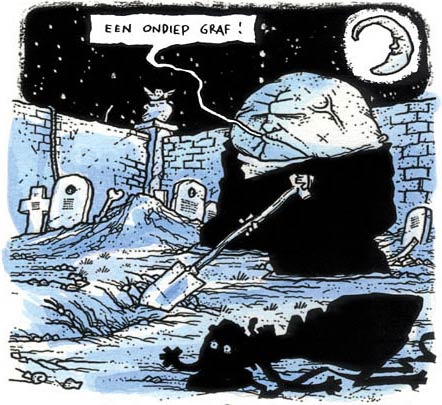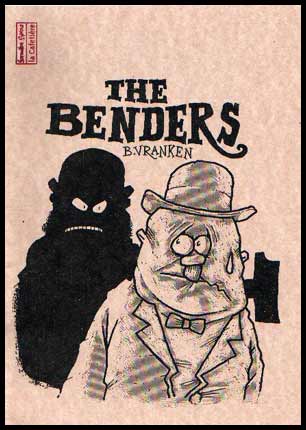'Groene Vingers'.
Benno Vranken was a Dutch artist from the watery province of Zeeland. His comics were populated with misanthropic characters with potato-shaped heads, who wander around gloomy harbor settings and post-apocalyptic sceneries. Emerging from the 1980s/1990s small press scene, Vranken's unique, coarse-grained drawing style was a regular attraction in the early issues of the alternative comic magazine Zone 5300. His work was later published in critically praised collections such as 'Kustbewoners' (2001), 'De Suikeroorlog' (2005), 'Schroot' (2008) and the "best of" compilation 'Dode Varkens' (2017).
Early life and work
Benno, or Ben, Vranken was born in 1962 in Flushing (Vlissingen), The Netherlands. Growing up in the province of Zeeland, he developed a fascination for boats, the sea and harbor settings. It was one of the reasons why he chose the Art Academy in the harbor city Rotterdam, instead of one in an inland city. He specialized in Visual Communication and Graphic Design, but maintained an interest in comics. He had his first experiences with comic art in the indie scene, self-publishing mini-comics such as 'Zwartwit Comics' (1983) and contributing to the amateur magazine Komikaze, along with Rudi Jonker, Pieter Dorrenboom and the duo Schalken & Van Dinther. In the early 1980s, Vranken also drew for MUG, a Rotterdam magazine for welfare recipients. Another early client was the newspaper De Telegraaf, for which he illustrated the scientific pages. Vranken eventually returned to Zeeland, and settled in Oost-Souburg.
'Nashville, Tennessee' (Wordt Vervolgd #77, October 1987).
Wordt Vervolgd & Zone 5300
Vranken reached a wider audience when he published a couple of short stories in Wordt Vervolgd magazine in 1986-1987. These stories lacked the trademark drawing style of his later comics, but were instead influenced by French authors such as Jacques Tardi and the Dutch cartoonist Jaap Vegter. They did however reflect the author's melancholic worldview, as well as his fascination with dirty, squeaky trains. It took until 1994 before Vranken returned to the comics forefront, this time as an editor and graphic designer for the early issues of Zone 5300. He also contributed short stories to the alternative Rotterdam magazine, and designed its original mascot, a grumpy dog. Vranken's dog was replaced by a new, more stylized dog by Luuk Bode in 1999.
Vranken's art also appeared in comic magazines like Gr'nn and Zozolala and found its way abroad. His comic books 'The Benders' (1998) and 'La Raie des Sables' (2000) were published by the French alternative label La Cafetière. Vranken was also represented in the massive 'Comix 2000' anthology (1999) by L'Association, and also in the USA in 'The SPX2004 Anthology' (2004) by the Comic Book Legal Defense Fund.
'The Benders'.
Style
A lonesome personality, Ben Vranken was at his best when drawing pessimistic characters with dented, potato-shaped heads and furrowed faces, while the world around them is in steady decay. The Dutch coastal province Zeeland was omnipresent, as most of Vranken's stories took place against impressionistic backgrounds full of muddy coastal salt marshes and depressing harbors with skewed buildings. Although his artwork was unique and revealed no direct influences, storywise the author found inspiration in the obscure, such as incomprehensible Eastern European movies. He preferred atmosphere over sensational plots. The pessimistic outset was compensated by the author's sense for irony and black comedy. Vranken was also original in his page lay-outs. Instead of using regular panels, the artist used only one, two or three drawings per page, without panel borders. He made most of his stories all by himself, although one short tale featured texts by Pieter M. Dorrenboom, who wrote them when the drawings were already finished.
'De Roestige Godin' (Zone 5300 #4, 2006).
Books
In the Netherlands, Vranken made his album debut with 'Kustbewoners' (2002), a story collection published by Zozolala's foundation Zet.El and Zone 5300. It compiled some of Vranken's most dismal tales of coast dwellers, including the recurring character Walburg. In the first story, the man drinks himself to death to be reunited with his deceased wife in the afterlife, only to discover she has already found another man there. Walburg dies again in his second story, shortly after killing his wife with a spade. The book was received with critical praise, and earned the author the VPRO Debut Prize of 2002. The Center of Visual Arts in Middelbrug released Vranken's book 'De Suikeroorlog' (2005), a limited edition with three stories from Zeeland's dark past, featuring bunkers and a sugar beet monster, among other things. The follow-up, 'Schroot' (Xtra, 2010), also met with positive response. The book collects three new tales about hard existence and boredom. In 2017, Xtra released a voluminous compilation book with Vranken's best work under the title 'Dode Varkens'.
'Als Het Niet Gaat Hoe Je Wil' (From: 'Mensen'.).
Graphic contributions
Illustrations by Vranken have appeared in Archeologie Magazine, De Telegraaf, Die Zeit Magazin, De Volkskrant and the publications of the Dutch Heart Patients Foundation. Vranken was also associated with Nukomix, a collective and platform founded by Maaike Hartjes, Jean-Marc van Tol, Mark Hendriks, Albo Helm, Marcel Ruijters and Nardja Kerkmeer to promote a different and more innovative form of comics in the Netherlands. For the anthology 'Mooi is Dat!' (2010), he made a comics impression of Stijn Streuvels' classic novel 'De Vlasschaard', and for 'Filmfanfare' (2012), he made a comic strip based on Erik de Bruyn's film 'Wilde Mossels' (2000). In 2016, he participated in Stijn Schenk's comics paper 'Mensen' (2016), which collected graphic stories about different kinds of mental illness and their acceptance in our society. The paper was made in collaboration with the Dolhuys Museum of the Mind in Haarlem.
Recognition
Ben Vranken's work has been part of several group and solo exhibitions, and during the 1999 Den Bosch comic festival, Vranken was awarded the PTT Post Support Prize.
Final years and death
Vranken was also active as a teacher in Visual Arts and Design at the Nehalennia school community in Middelburg. One of the masters of contemporary Dutch alternative comics, Ben Vranken passed away after an illness on the night of 21 and 22 March 2019. He was only 57 years old.








